Impact of Social and Cultural Elements on Business Sustainability
VerifiedAdded on 2022/09/18
|6
|1760
|24
Essay
AI Summary
This essay examines the increasing importance of social and cultural elements in business sustainability. It delves into how modern business entities are integrating social considerations to understand buyer behavior and enhance brand loyalty, highlighting the interconnectedness of social, economic, and environmental aspects. The paper discusses the impact of environmental factors on employee well-being and introduces the Individual Empowerment Theory as a key to sustaining social well-being. Furthermore, it explores the role of cultural sustainability in maintaining cultural beliefs, heritage, and organizational behavior, emphasizing the significance of diversity management in modern pluralistic organizations. The essay concludes that incorporating social and cultural aspects widens the community base, enhances employee retention, and strengthens brand image, providing a competitive advantage for businesses.
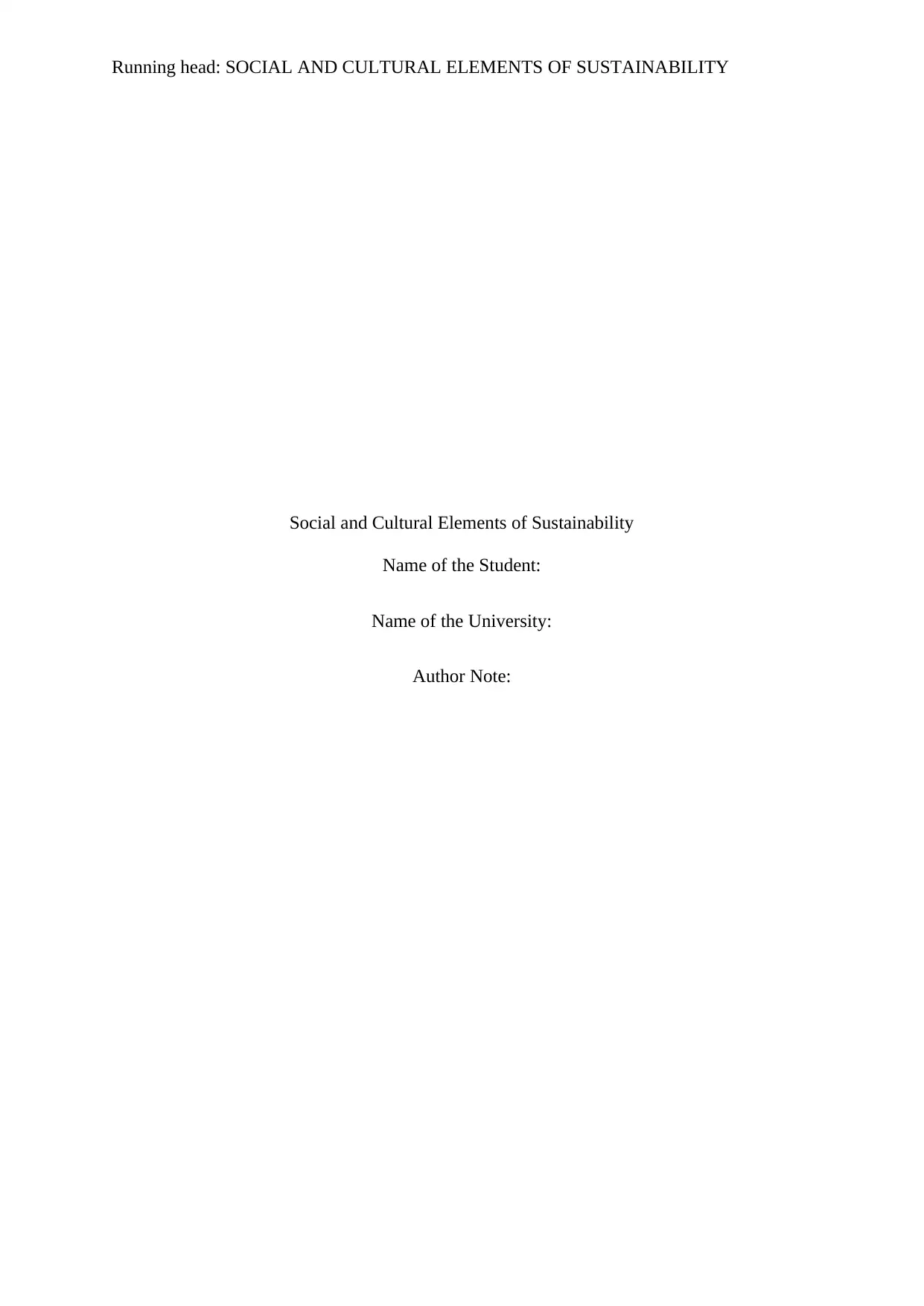
Running head: SOCIAL AND CULTURAL ELEMENTS OF SUSTAINABILITY
Social and Cultural Elements of Sustainability
Name of the Student:
Name of the University:
Author Note:
Social and Cultural Elements of Sustainability
Name of the Student:
Name of the University:
Author Note:
Paraphrase This Document
Need a fresh take? Get an instant paraphrase of this document with our AI Paraphraser
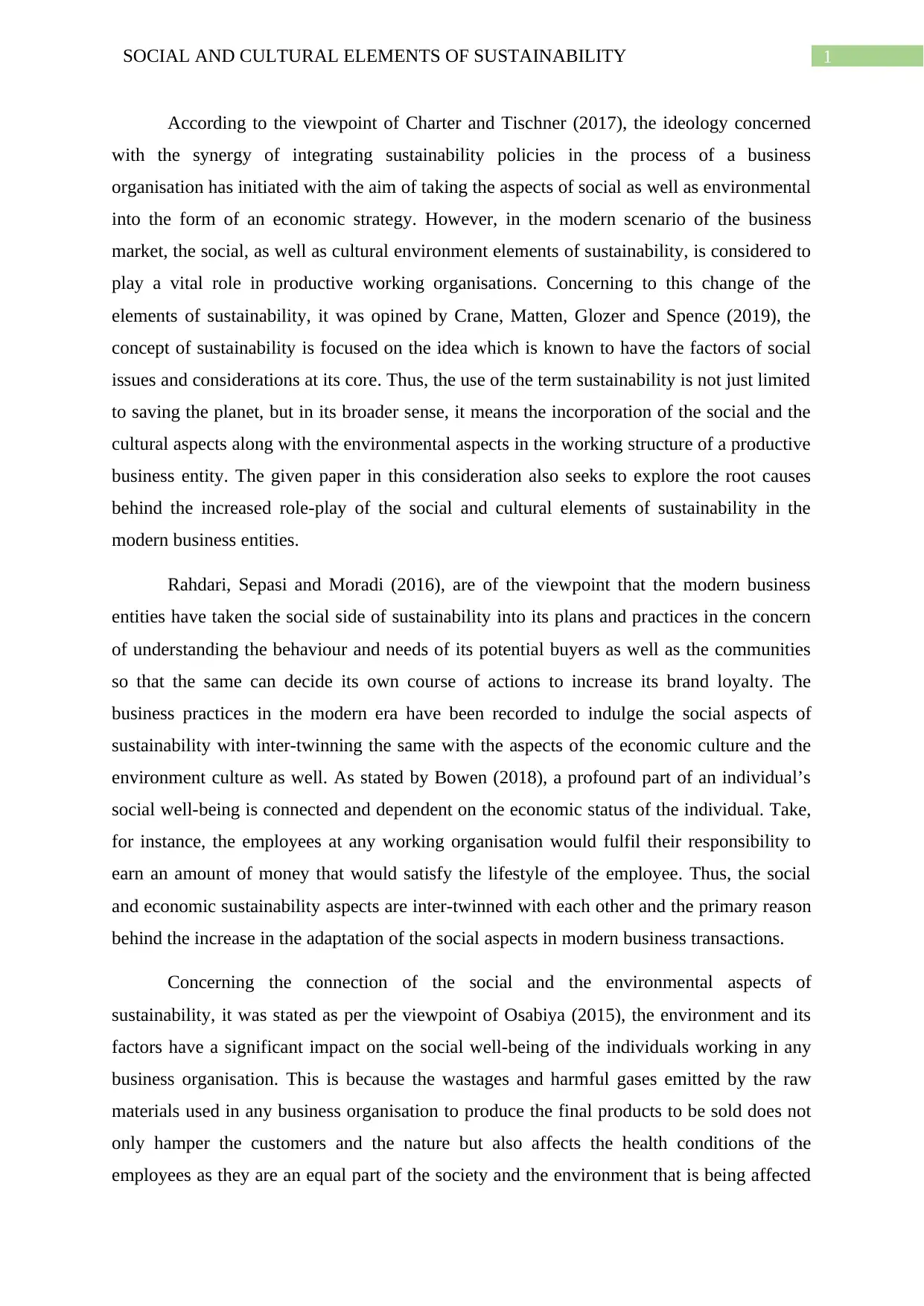
1SOCIAL AND CULTURAL ELEMENTS OF SUSTAINABILITY
According to the viewpoint of Charter and Tischner (2017), the ideology concerned
with the synergy of integrating sustainability policies in the process of a business
organisation has initiated with the aim of taking the aspects of social as well as environmental
into the form of an economic strategy. However, in the modern scenario of the business
market, the social, as well as cultural environment elements of sustainability, is considered to
play a vital role in productive working organisations. Concerning to this change of the
elements of sustainability, it was opined by Crane, Matten, Glozer and Spence (2019), the
concept of sustainability is focused on the idea which is known to have the factors of social
issues and considerations at its core. Thus, the use of the term sustainability is not just limited
to saving the planet, but in its broader sense, it means the incorporation of the social and the
cultural aspects along with the environmental aspects in the working structure of a productive
business entity. The given paper in this consideration also seeks to explore the root causes
behind the increased role-play of the social and cultural elements of sustainability in the
modern business entities.
Rahdari, Sepasi and Moradi (2016), are of the viewpoint that the modern business
entities have taken the social side of sustainability into its plans and practices in the concern
of understanding the behaviour and needs of its potential buyers as well as the communities
so that the same can decide its own course of actions to increase its brand loyalty. The
business practices in the modern era have been recorded to indulge the social aspects of
sustainability with inter-twinning the same with the aspects of the economic culture and the
environment culture as well. As stated by Bowen (2018), a profound part of an individual’s
social well-being is connected and dependent on the economic status of the individual. Take,
for instance, the employees at any working organisation would fulfil their responsibility to
earn an amount of money that would satisfy the lifestyle of the employee. Thus, the social
and economic sustainability aspects are inter-twinned with each other and the primary reason
behind the increase in the adaptation of the social aspects in modern business transactions.
Concerning the connection of the social and the environmental aspects of
sustainability, it was stated as per the viewpoint of Osabiya (2015), the environment and its
factors have a significant impact on the social well-being of the individuals working in any
business organisation. This is because the wastages and harmful gases emitted by the raw
materials used in any business organisation to produce the final products to be sold does not
only hamper the customers and the nature but also affects the health conditions of the
employees as they are an equal part of the society and the environment that is being affected
According to the viewpoint of Charter and Tischner (2017), the ideology concerned
with the synergy of integrating sustainability policies in the process of a business
organisation has initiated with the aim of taking the aspects of social as well as environmental
into the form of an economic strategy. However, in the modern scenario of the business
market, the social, as well as cultural environment elements of sustainability, is considered to
play a vital role in productive working organisations. Concerning to this change of the
elements of sustainability, it was opined by Crane, Matten, Glozer and Spence (2019), the
concept of sustainability is focused on the idea which is known to have the factors of social
issues and considerations at its core. Thus, the use of the term sustainability is not just limited
to saving the planet, but in its broader sense, it means the incorporation of the social and the
cultural aspects along with the environmental aspects in the working structure of a productive
business entity. The given paper in this consideration also seeks to explore the root causes
behind the increased role-play of the social and cultural elements of sustainability in the
modern business entities.
Rahdari, Sepasi and Moradi (2016), are of the viewpoint that the modern business
entities have taken the social side of sustainability into its plans and practices in the concern
of understanding the behaviour and needs of its potential buyers as well as the communities
so that the same can decide its own course of actions to increase its brand loyalty. The
business practices in the modern era have been recorded to indulge the social aspects of
sustainability with inter-twinning the same with the aspects of the economic culture and the
environment culture as well. As stated by Bowen (2018), a profound part of an individual’s
social well-being is connected and dependent on the economic status of the individual. Take,
for instance, the employees at any working organisation would fulfil their responsibility to
earn an amount of money that would satisfy the lifestyle of the employee. Thus, the social
and economic sustainability aspects are inter-twinned with each other and the primary reason
behind the increase in the adaptation of the social aspects in modern business transactions.
Concerning the connection of the social and the environmental aspects of
sustainability, it was stated as per the viewpoint of Osabiya (2015), the environment and its
factors have a significant impact on the social well-being of the individuals working in any
business organisation. This is because the wastages and harmful gases emitted by the raw
materials used in any business organisation to produce the final products to be sold does not
only hamper the customers and the nature but also affects the health conditions of the
employees as they are an equal part of the society and the environment that is being affected
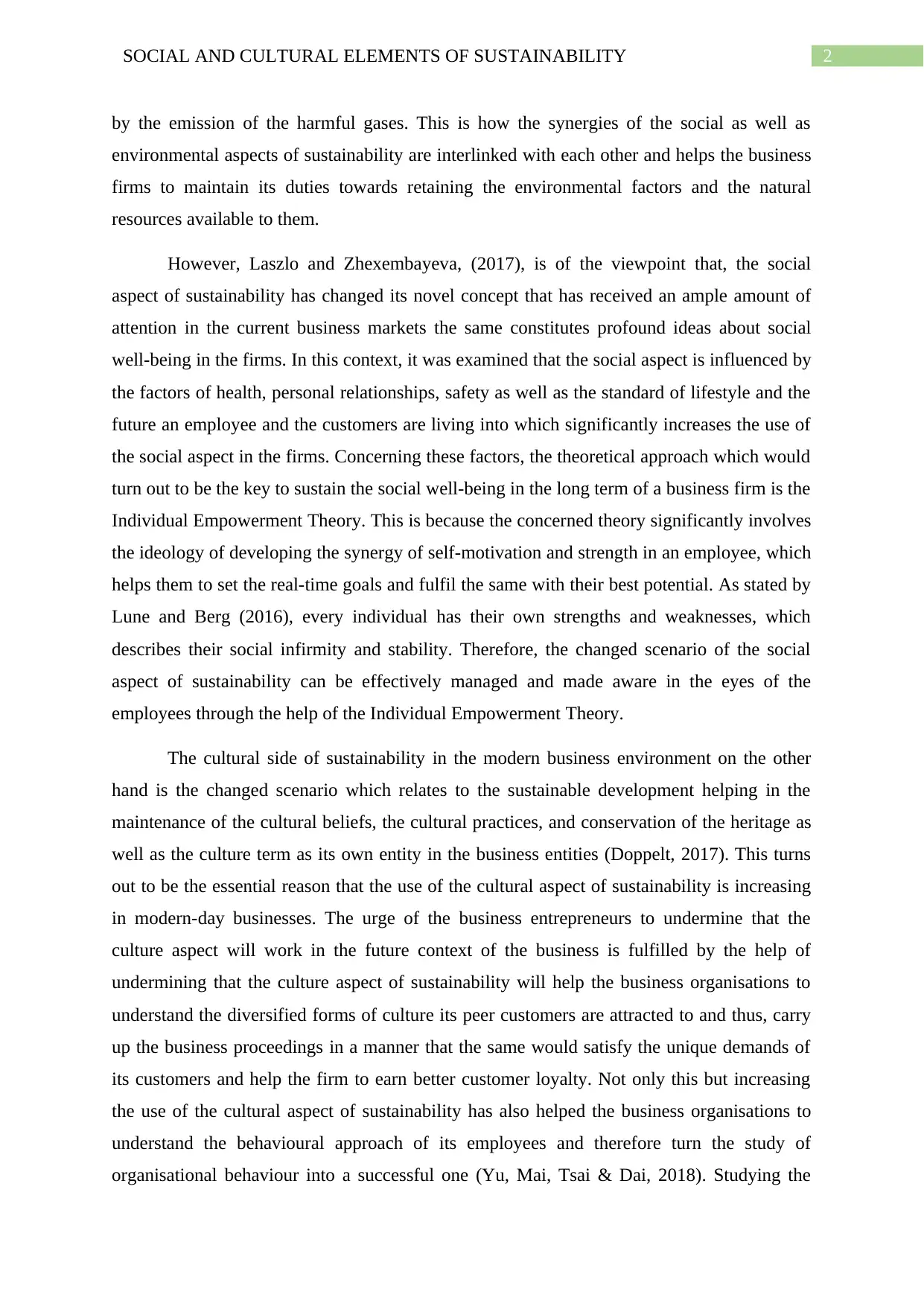
2SOCIAL AND CULTURAL ELEMENTS OF SUSTAINABILITY
by the emission of the harmful gases. This is how the synergies of the social as well as
environmental aspects of sustainability are interlinked with each other and helps the business
firms to maintain its duties towards retaining the environmental factors and the natural
resources available to them.
However, Laszlo and Zhexembayeva, (2017), is of the viewpoint that, the social
aspect of sustainability has changed its novel concept that has received an ample amount of
attention in the current business markets the same constitutes profound ideas about social
well-being in the firms. In this context, it was examined that the social aspect is influenced by
the factors of health, personal relationships, safety as well as the standard of lifestyle and the
future an employee and the customers are living into which significantly increases the use of
the social aspect in the firms. Concerning these factors, the theoretical approach which would
turn out to be the key to sustain the social well-being in the long term of a business firm is the
Individual Empowerment Theory. This is because the concerned theory significantly involves
the ideology of developing the synergy of self-motivation and strength in an employee, which
helps them to set the real-time goals and fulfil the same with their best potential. As stated by
Lune and Berg (2016), every individual has their own strengths and weaknesses, which
describes their social infirmity and stability. Therefore, the changed scenario of the social
aspect of sustainability can be effectively managed and made aware in the eyes of the
employees through the help of the Individual Empowerment Theory.
The cultural side of sustainability in the modern business environment on the other
hand is the changed scenario which relates to the sustainable development helping in the
maintenance of the cultural beliefs, the cultural practices, and conservation of the heritage as
well as the culture term as its own entity in the business entities (Doppelt, 2017). This turns
out to be the essential reason that the use of the cultural aspect of sustainability is increasing
in modern-day businesses. The urge of the business entrepreneurs to undermine that the
culture aspect will work in the future context of the business is fulfilled by the help of
undermining that the culture aspect of sustainability will help the business organisations to
understand the diversified forms of culture its peer customers are attracted to and thus, carry
up the business proceedings in a manner that the same would satisfy the unique demands of
its customers and help the firm to earn better customer loyalty. Not only this but increasing
the use of the cultural aspect of sustainability has also helped the business organisations to
understand the behavioural approach of its employees and therefore turn the study of
organisational behaviour into a successful one (Yu, Mai, Tsai & Dai, 2018). Studying the
by the emission of the harmful gases. This is how the synergies of the social as well as
environmental aspects of sustainability are interlinked with each other and helps the business
firms to maintain its duties towards retaining the environmental factors and the natural
resources available to them.
However, Laszlo and Zhexembayeva, (2017), is of the viewpoint that, the social
aspect of sustainability has changed its novel concept that has received an ample amount of
attention in the current business markets the same constitutes profound ideas about social
well-being in the firms. In this context, it was examined that the social aspect is influenced by
the factors of health, personal relationships, safety as well as the standard of lifestyle and the
future an employee and the customers are living into which significantly increases the use of
the social aspect in the firms. Concerning these factors, the theoretical approach which would
turn out to be the key to sustain the social well-being in the long term of a business firm is the
Individual Empowerment Theory. This is because the concerned theory significantly involves
the ideology of developing the synergy of self-motivation and strength in an employee, which
helps them to set the real-time goals and fulfil the same with their best potential. As stated by
Lune and Berg (2016), every individual has their own strengths and weaknesses, which
describes their social infirmity and stability. Therefore, the changed scenario of the social
aspect of sustainability can be effectively managed and made aware in the eyes of the
employees through the help of the Individual Empowerment Theory.
The cultural side of sustainability in the modern business environment on the other
hand is the changed scenario which relates to the sustainable development helping in the
maintenance of the cultural beliefs, the cultural practices, and conservation of the heritage as
well as the culture term as its own entity in the business entities (Doppelt, 2017). This turns
out to be the essential reason that the use of the cultural aspect of sustainability is increasing
in modern-day businesses. The urge of the business entrepreneurs to undermine that the
culture aspect will work in the future context of the business is fulfilled by the help of
undermining that the culture aspect of sustainability will help the business organisations to
understand the diversified forms of culture its peer customers are attracted to and thus, carry
up the business proceedings in a manner that the same would satisfy the unique demands of
its customers and help the firm to earn better customer loyalty. Not only this but increasing
the use of the cultural aspect of sustainability has also helped the business organisations to
understand the behavioural approach of its employees and therefore turn the study of
organisational behaviour into a successful one (Yu, Mai, Tsai & Dai, 2018). Studying the
⊘ This is a preview!⊘
Do you want full access?
Subscribe today to unlock all pages.

Trusted by 1+ million students worldwide
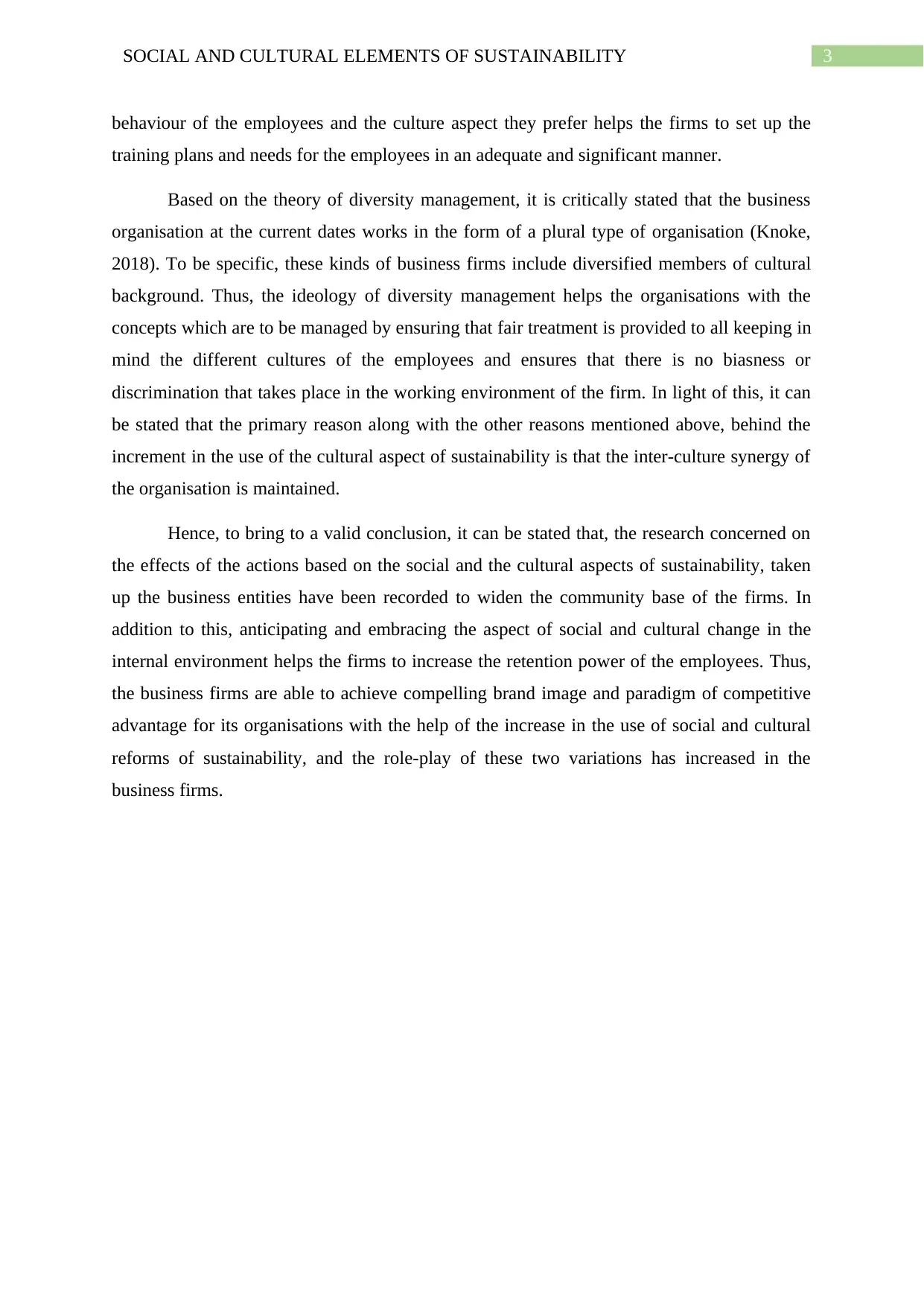
3SOCIAL AND CULTURAL ELEMENTS OF SUSTAINABILITY
behaviour of the employees and the culture aspect they prefer helps the firms to set up the
training plans and needs for the employees in an adequate and significant manner.
Based on the theory of diversity management, it is critically stated that the business
organisation at the current dates works in the form of a plural type of organisation (Knoke,
2018). To be specific, these kinds of business firms include diversified members of cultural
background. Thus, the ideology of diversity management helps the organisations with the
concepts which are to be managed by ensuring that fair treatment is provided to all keeping in
mind the different cultures of the employees and ensures that there is no biasness or
discrimination that takes place in the working environment of the firm. In light of this, it can
be stated that the primary reason along with the other reasons mentioned above, behind the
increment in the use of the cultural aspect of sustainability is that the inter-culture synergy of
the organisation is maintained.
Hence, to bring to a valid conclusion, it can be stated that, the research concerned on
the effects of the actions based on the social and the cultural aspects of sustainability, taken
up the business entities have been recorded to widen the community base of the firms. In
addition to this, anticipating and embracing the aspect of social and cultural change in the
internal environment helps the firms to increase the retention power of the employees. Thus,
the business firms are able to achieve compelling brand image and paradigm of competitive
advantage for its organisations with the help of the increase in the use of social and cultural
reforms of sustainability, and the role-play of these two variations has increased in the
business firms.
behaviour of the employees and the culture aspect they prefer helps the firms to set up the
training plans and needs for the employees in an adequate and significant manner.
Based on the theory of diversity management, it is critically stated that the business
organisation at the current dates works in the form of a plural type of organisation (Knoke,
2018). To be specific, these kinds of business firms include diversified members of cultural
background. Thus, the ideology of diversity management helps the organisations with the
concepts which are to be managed by ensuring that fair treatment is provided to all keeping in
mind the different cultures of the employees and ensures that there is no biasness or
discrimination that takes place in the working environment of the firm. In light of this, it can
be stated that the primary reason along with the other reasons mentioned above, behind the
increment in the use of the cultural aspect of sustainability is that the inter-culture synergy of
the organisation is maintained.
Hence, to bring to a valid conclusion, it can be stated that, the research concerned on
the effects of the actions based on the social and the cultural aspects of sustainability, taken
up the business entities have been recorded to widen the community base of the firms. In
addition to this, anticipating and embracing the aspect of social and cultural change in the
internal environment helps the firms to increase the retention power of the employees. Thus,
the business firms are able to achieve compelling brand image and paradigm of competitive
advantage for its organisations with the help of the increase in the use of social and cultural
reforms of sustainability, and the role-play of these two variations has increased in the
business firms.
Paraphrase This Document
Need a fresh take? Get an instant paraphrase of this document with our AI Paraphraser
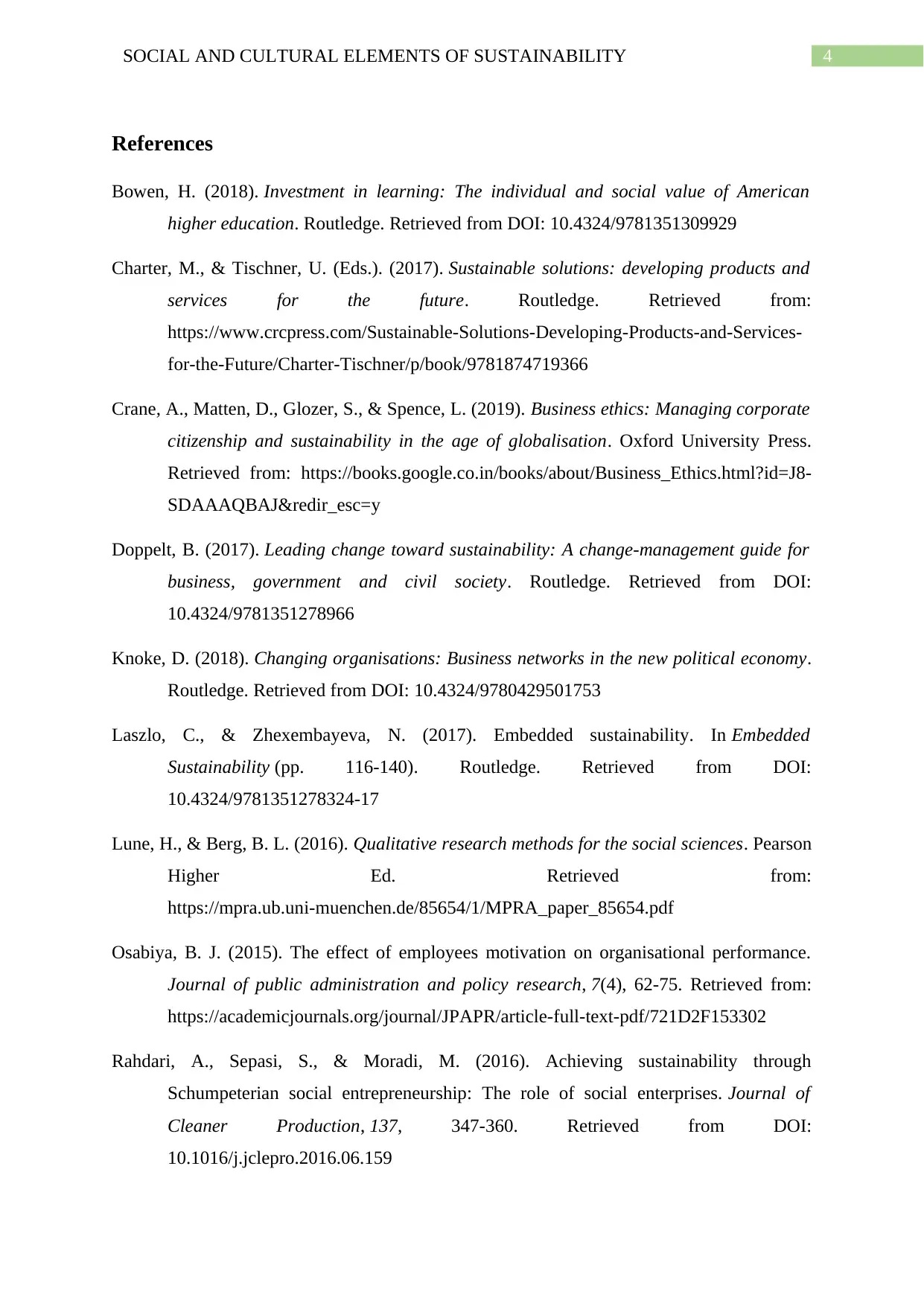
4SOCIAL AND CULTURAL ELEMENTS OF SUSTAINABILITY
References
Bowen, H. (2018). Investment in learning: The individual and social value of American
higher education. Routledge. Retrieved from DOI: 10.4324/9781351309929
Charter, M., & Tischner, U. (Eds.). (2017). Sustainable solutions: developing products and
services for the future. Routledge. Retrieved from:
https://www.crcpress.com/Sustainable-Solutions-Developing-Products-and-Services-
for-the-Future/Charter-Tischner/p/book/9781874719366
Crane, A., Matten, D., Glozer, S., & Spence, L. (2019). Business ethics: Managing corporate
citizenship and sustainability in the age of globalisation. Oxford University Press.
Retrieved from: https://books.google.co.in/books/about/Business_Ethics.html?id=J8-
SDAAAQBAJ&redir_esc=y
Doppelt, B. (2017). Leading change toward sustainability: A change-management guide for
business, government and civil society. Routledge. Retrieved from DOI:
10.4324/9781351278966
Knoke, D. (2018). Changing organisations: Business networks in the new political economy.
Routledge. Retrieved from DOI: 10.4324/9780429501753
Laszlo, C., & Zhexembayeva, N. (2017). Embedded sustainability. In Embedded
Sustainability (pp. 116-140). Routledge. Retrieved from DOI:
10.4324/9781351278324-17
Lune, H., & Berg, B. L. (2016). Qualitative research methods for the social sciences. Pearson
Higher Ed. Retrieved from:
https://mpra.ub.uni-muenchen.de/85654/1/MPRA_paper_85654.pdf
Osabiya, B. J. (2015). The effect of employees motivation on organisational performance.
Journal of public administration and policy research, 7(4), 62-75. Retrieved from:
https://academicjournals.org/journal/JPAPR/article-full-text-pdf/721D2F153302
Rahdari, A., Sepasi, S., & Moradi, M. (2016). Achieving sustainability through
Schumpeterian social entrepreneurship: The role of social enterprises. Journal of
Cleaner Production, 137, 347-360. Retrieved from DOI:
10.1016/j.jclepro.2016.06.159
References
Bowen, H. (2018). Investment in learning: The individual and social value of American
higher education. Routledge. Retrieved from DOI: 10.4324/9781351309929
Charter, M., & Tischner, U. (Eds.). (2017). Sustainable solutions: developing products and
services for the future. Routledge. Retrieved from:
https://www.crcpress.com/Sustainable-Solutions-Developing-Products-and-Services-
for-the-Future/Charter-Tischner/p/book/9781874719366
Crane, A., Matten, D., Glozer, S., & Spence, L. (2019). Business ethics: Managing corporate
citizenship and sustainability in the age of globalisation. Oxford University Press.
Retrieved from: https://books.google.co.in/books/about/Business_Ethics.html?id=J8-
SDAAAQBAJ&redir_esc=y
Doppelt, B. (2017). Leading change toward sustainability: A change-management guide for
business, government and civil society. Routledge. Retrieved from DOI:
10.4324/9781351278966
Knoke, D. (2018). Changing organisations: Business networks in the new political economy.
Routledge. Retrieved from DOI: 10.4324/9780429501753
Laszlo, C., & Zhexembayeva, N. (2017). Embedded sustainability. In Embedded
Sustainability (pp. 116-140). Routledge. Retrieved from DOI:
10.4324/9781351278324-17
Lune, H., & Berg, B. L. (2016). Qualitative research methods for the social sciences. Pearson
Higher Ed. Retrieved from:
https://mpra.ub.uni-muenchen.de/85654/1/MPRA_paper_85654.pdf
Osabiya, B. J. (2015). The effect of employees motivation on organisational performance.
Journal of public administration and policy research, 7(4), 62-75. Retrieved from:
https://academicjournals.org/journal/JPAPR/article-full-text-pdf/721D2F153302
Rahdari, A., Sepasi, S., & Moradi, M. (2016). Achieving sustainability through
Schumpeterian social entrepreneurship: The role of social enterprises. Journal of
Cleaner Production, 137, 347-360. Retrieved from DOI:
10.1016/j.jclepro.2016.06.159
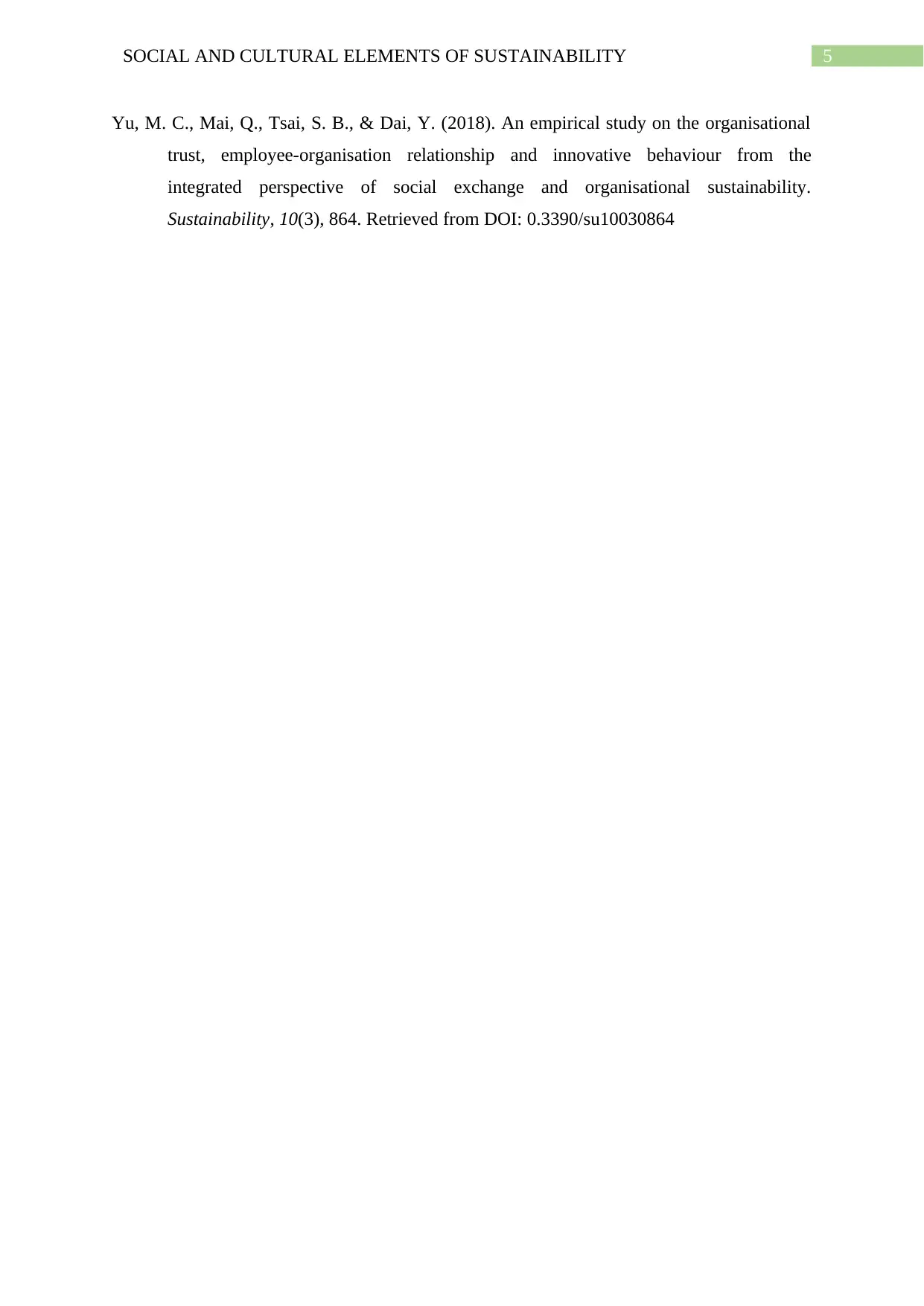
5SOCIAL AND CULTURAL ELEMENTS OF SUSTAINABILITY
Yu, M. C., Mai, Q., Tsai, S. B., & Dai, Y. (2018). An empirical study on the organisational
trust, employee-organisation relationship and innovative behaviour from the
integrated perspective of social exchange and organisational sustainability.
Sustainability, 10(3), 864. Retrieved from DOI: 0.3390/su10030864
Yu, M. C., Mai, Q., Tsai, S. B., & Dai, Y. (2018). An empirical study on the organisational
trust, employee-organisation relationship and innovative behaviour from the
integrated perspective of social exchange and organisational sustainability.
Sustainability, 10(3), 864. Retrieved from DOI: 0.3390/su10030864
⊘ This is a preview!⊘
Do you want full access?
Subscribe today to unlock all pages.

Trusted by 1+ million students worldwide
1 out of 6
Related Documents
Your All-in-One AI-Powered Toolkit for Academic Success.
+13062052269
info@desklib.com
Available 24*7 on WhatsApp / Email
![[object Object]](/_next/static/media/star-bottom.7253800d.svg)
Unlock your academic potential
Copyright © 2020–2026 A2Z Services. All Rights Reserved. Developed and managed by ZUCOL.





